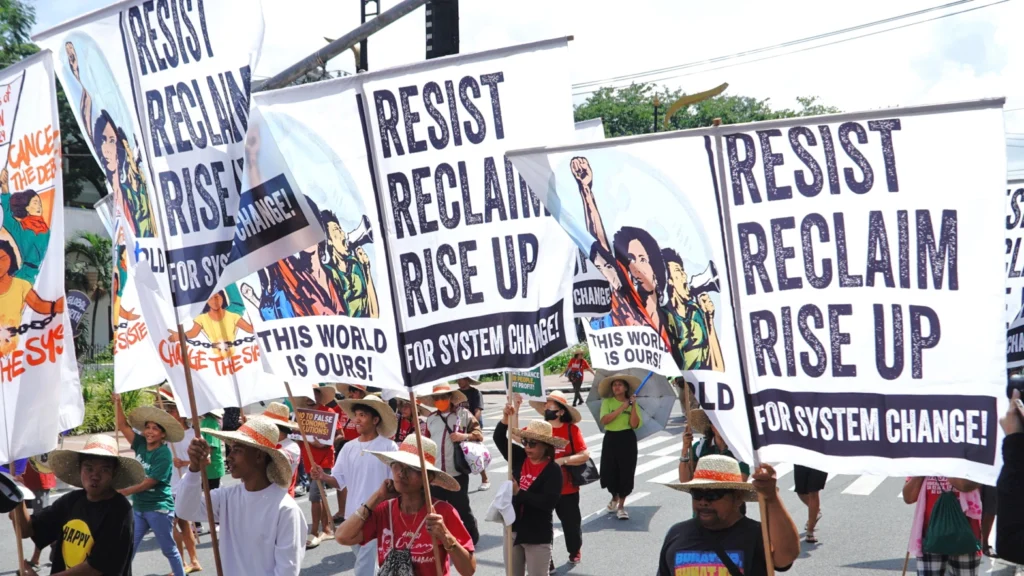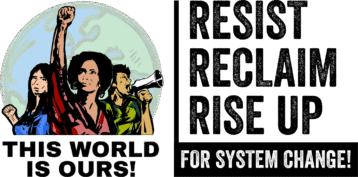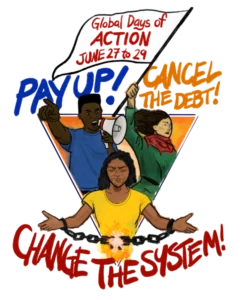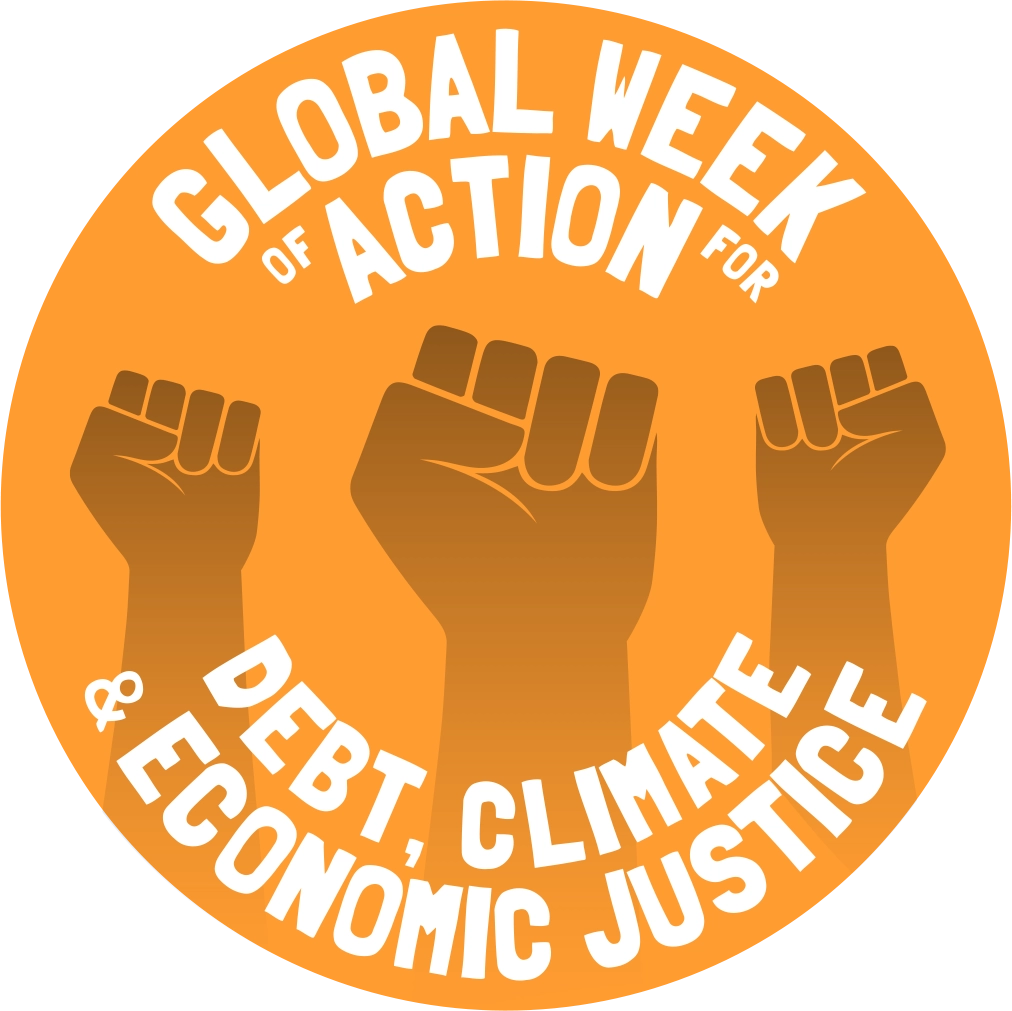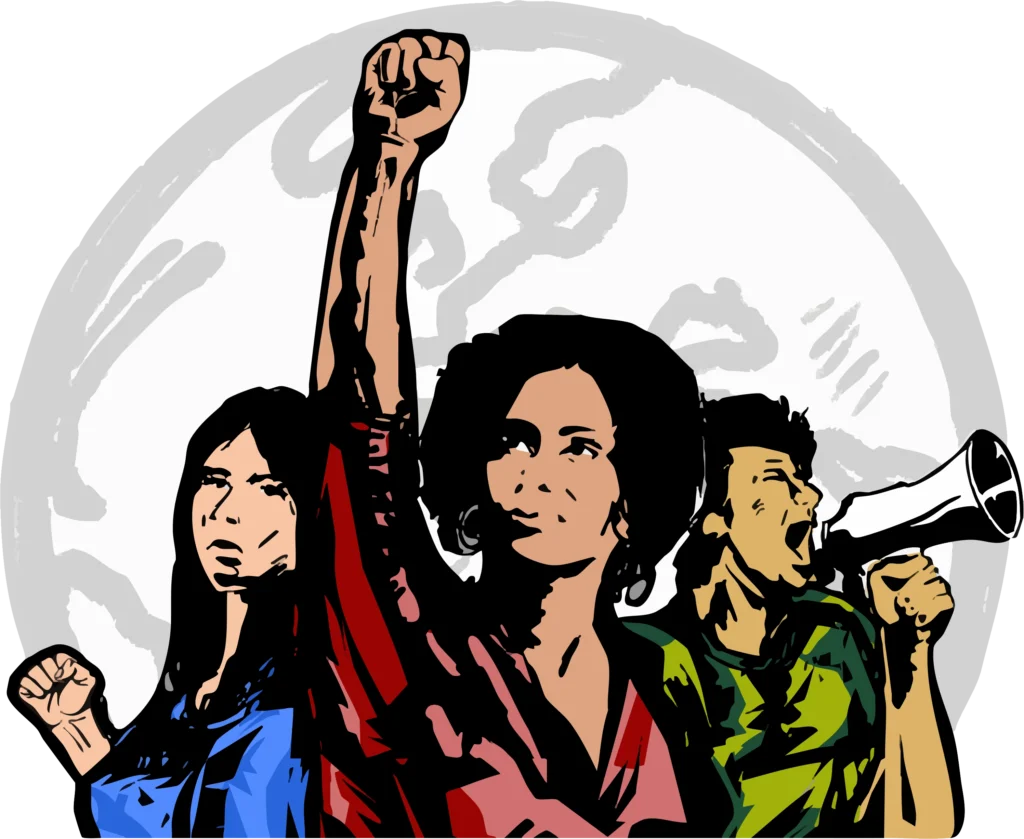
CALL FOR GLOBAL MOBILIZATIONS
We invite all citizens, groups, communities, and movements everywhere – this year, 2025, let us take our struggles to new heights. Let us join forces and together organize globally coordinated mobilizations – in various forms, in different cities and towns, in as many countries as we can – during these Global Days of Action:
All over the world, peoples and communities are fighting for survival, for their rights, for justice in the face of economic turmoils, ecological and climate catastrophes, political instabilities, vicious attacks on fundamental human rights, militarization, and, in places like Palestine and Sudan, genocide.
Militarisation and authoritarianism are on the rise everywhere. Governments are cracking down on protests, with journalists, activists and citizens facing intimidation or worse. Human rights are under siege—from attacks on reproductive freedom, the criminalization of dissent, the persecution of marginalized communities and people of color, and genocidal attacks on peoples. Governments of the countries most responsible for the climate crisis spent a record $2.7 trillion in 2024 on the military and war, yet have pledged less than $800 million for Loss and Damage. Much of $2.7 trillion is taxpayers money but was used to profit arms company shareholders. The shareholders profiting from fossil fuels, mining, tech and arms are largely the same—connected via fund management firms like BlackRock.
These crises do not exist in isolation—they overlap, compound, and amplify each other. These crises share common roots in historically unequal economic and social structures, in modes of of extraction, production, distribution, consumption, and in international and national financial architecture — that sacrifice the needs of the many to the interests of a few, that treat the Earth’s gifts not as a shared inheritance but as commodities to be plundered, bought, sold, and exploited, that sees people —especially the poor, Indigenous, women, people of color —as expendable labor or obstacles to profit and concentrated power. These structures are preserved by political systems where power and military might are used with impunity against people, against resistance, against rights, to protect and advance elite and corporate interests.
The rules that govern the global economy are designed to concentrate wealth and power in the hands of the few, while the many are left to grapple with dispossession, displacement, and disaster. A handful of billionaires are hoarding more wealth and power than half of the world’s population, while billions struggle to meet basic needs in the face of soaring inflation, rising unemployment, widening inequality, and deepening discrimination.
The indiscriminate and excessive extraction of resources, the overproduction of goods and the promotion of wasteful consumption that accompany the relentless pursuit of profits by the world’s elites has led to severe and intensifying ecological and climate crises. As of 2021, countries of the Global North are responsible for more than half of global historically accumulated GHG emissions yet their share of the global population was only 12%. And the richest 10% of the global population are responsible for nearly half of all greenhouse gas emissions. The ecological and climate crises are bringing floods, wildfires, and heatwaves, displacing families, decimating homes and livelihoods, magnifying domestic and care work which unjustly falls on women, and resulting in loss of lives and culture. = Impacting everyone, especially people in the Global South – those least responsible, yet most affected.
Meanwhile, fossil fuel industries, alongside governments, continue to promote the expansion of fossil fuels, the biggest single source of emissions. While households struggle to pay their energy bills, the fossil fuel industry is profiting from these rising prices, making on average $1 trillion in annual profits. Profits that are being propped up with subsidies paid by taxpayers.
In and beneath the soil, in the green canopies of forests, in the vast, blue stretch of the oceans, and in the atmosphere lie the foundations of life itself. These natural systems can nourish, shelter, and sustain every living being. Land, forests, oceans, and the atmosphere are commons. All peoples and communities —urban and rural, of riverbanks, forests, oceans, deserts, mangroves and other biomass, of all colors, ethnicities, castes and races, women, men, trans and gender diverse persons, people with disabilities, workers, farmers, fishers, children, youth and indigenous peoples, in all territories— have equal and collective rights and shared responsibilities to be stewards of the commons. This stewardship must be grounded in reciprocity and non-exploitation, ensuring that the commons equitably provide for the necessities of a life of dignity and abundance for all.
But in the modern capitalist economy, nature has been parceled off, privatized, and even transformed and traded as financial assets. Land is hoarded by the wealthy while millions are landless. Forests are felled for short-term profit, robbing future generations of clean air and biodiversity. Oceans, once teeming with life, are overfished and polluted to the brink of collapse. The atmosphere is rapidly and excessively filled with greenhouse gases from the production and consumption of fossil fuels and the destruction of natural carbon sinks. The economic and climate crises are driven by the logic of taking as much as possible, as fast as possible, for as much private profit as possible.

The global economic and financial system, shaped over centuries by colonialism, capitalism, patriarchy and geopolitical power struggles, is profoundly inequitable and unjust.
The foundations of the global economic order were laid during colonialism when resources, labor, and wealth flowed from colonized nations to the colonial powers, creating patterns of inequality that persist today. Following the end of formal colonialism, new global institutions emerged—like the International Monetary Fund (IMF), World Bank, and later, the World Trade Organization (WTO)—promising development and stability. However, these institutions were designed by and for powerful countries of the Global North, entrenching a system where economic rules and decisions are set by the few while the many are expected to comply. Despite evidence and recognition of the flaws and failures of current global economic governance, the Global North continues to prop up the status quo.
The global economic and financial system enables vast net outflows of resources from Global South to North. These net transfers are embedded in highly extractivist global and national fiscal, monetary, finance, trade, and investment systems and take various forms, including profit repatriation, tax evasion and avoidance, illicit financial flows, extraction and plunder of natural resources, interest payments, appropriation of land, exploitation of labor, and commodification of nature.
Through biased distribution of taxing rights, tax evasion, profit shifting and other types of illicit financial flows, as well as the use of tax havens, corporations and elites extract wealth from the Global South and hide it offshore. Unsustainable and illegitimate public debts accumulate in the Global South, much of which is incurred through supply-driven lending by public and private creditors, under unfair terms, or through financing projects that fail to serve public needs or have been proven harmful to people. Global South countries are under extreme pressure to prioritize debt payments to bilateral and multilateral institutions, private banks, and bondholders over financing public services, social justice programs, and climate actions, even amid climate disasters, pandemics, and poverty crises. Calls for debt cancellation or restructuring are frequently ignored, trapping countries in endless cycles of borrowing and repayment.
Financialization – the dominance of financial markets, institutions, and motives over the global and national economies, and the treatment of public goods and nature into mere financial assets – has been wreaking its horrific impacts on people, the environment and entire countries. Financialization generates and concentrates non-productive wealth, fuels inequalities, destabilizes economies, and prioritizes rapid, short-term financial returns over human needs, equity, and long-term sustainability. Speculative activities that are at the core of financialization have led to skyrocketing prices of food and basic commodities, and housing and public services crises. During periodic episodes of global financial crises, governments mobilized trillions of dollars to rescue big banks and financial institutions and stabilize financial markets – and left millions of people and Southern economies to deal with the fall out.
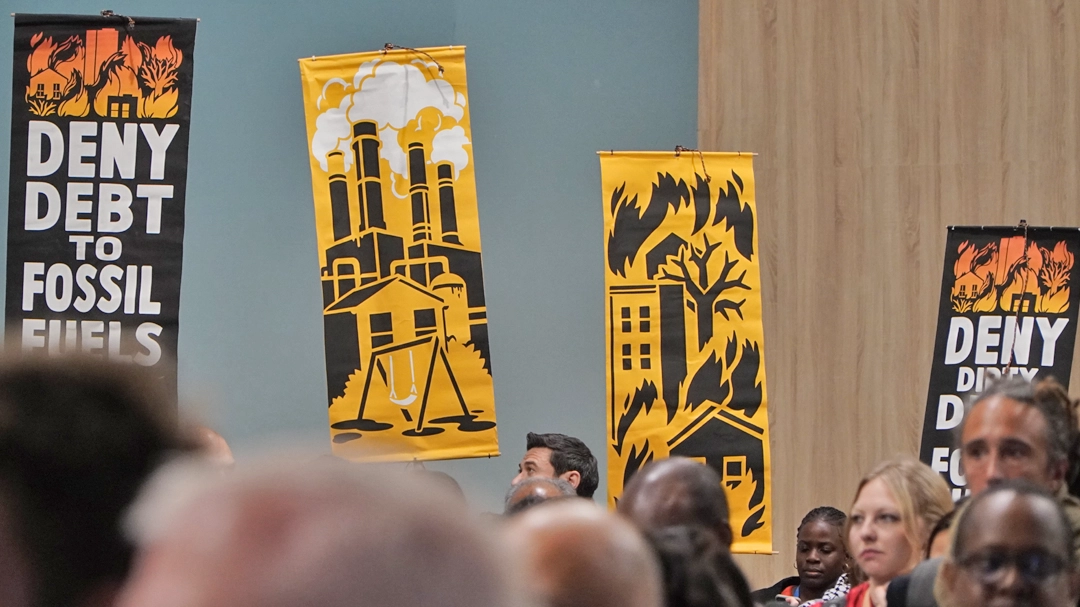
Global trade rules are another pillar of the unjust system. Under the WTO and various free trade agreements, Global South countries are pressured to open their markets, remove subsidies, import substandard, inappropriate or too costly technologies, and protect foreign investors, often at the cost of their industries, farmers, and workers. Trade agreements protect the interests and agenda of investors but not the rights of workers and communities or the health of ecosystems. Meanwhile, Global North countries maintain protectionist policies when these suit their interests.
The global economic and financial system is also deeply gendered, reinforcing patriarchal norms and institutionalizing the oppression, exclusion, exploitation, and marginalization of women and people of other gender identities. The structure, logic, and outcomes of today’s global economy reproduce gender hierarchies and entrench gender inequalities, even as the system depends on women’s unpaid labor.
Perhaps the most urgent manifestation of the flaws and injustices of the global economic system is the climate crisis, which is part of a wider ecological crisis. Since the Industrial Revolution, coal, oil, and gas have powered industries, transportation, and economies. These energy sources have enabled exponential economic growth, particularly in the Global North, but have also resulted in the rapid rise and excessive concentration of greenhouse gases in the atmosphere, leading to global warming and climate change. Rich countries and corporations are responsible for the vast majority of historical and current greenhouse gas emissions. Yet those least responsible – countries and communities in the Global South – suffer the worst consequences.
Despite international acknowledgement of the climate emergency and promises of action, governments worldwide – but especially those of the Global North, who are most responsible for climate change – have failed to undertake ambitious and adequate climate action. Governments continue to subsidize fossil fuels while underfunding renewable energy and public services. Climate finance flows – an obligation of the Global North to the Global South – remain outrageously inadequate. Much of these climate finance flows are inappropriately in the form of loans, thus further exacerbating the debt burdens of the Global South. Climate finance flows are also double-counted as part of ODA commitments that have also not been fully met. Climate finance and even ODA commitments should be seen as part of reparations of the Global North to the Global South for historical and continuing harms.
The huge and continuing net extraction of natural resources and wealth from the Global South to the Global North must end, and thus the relations, structures, and policies that enable it. The inequitable and exploitative economic and political relations between and within countries must be transformed, and the unjust institutions of global economic and financial governance must be profoundly recast if not completely replaced to ensure democratic global economic and financial governance.
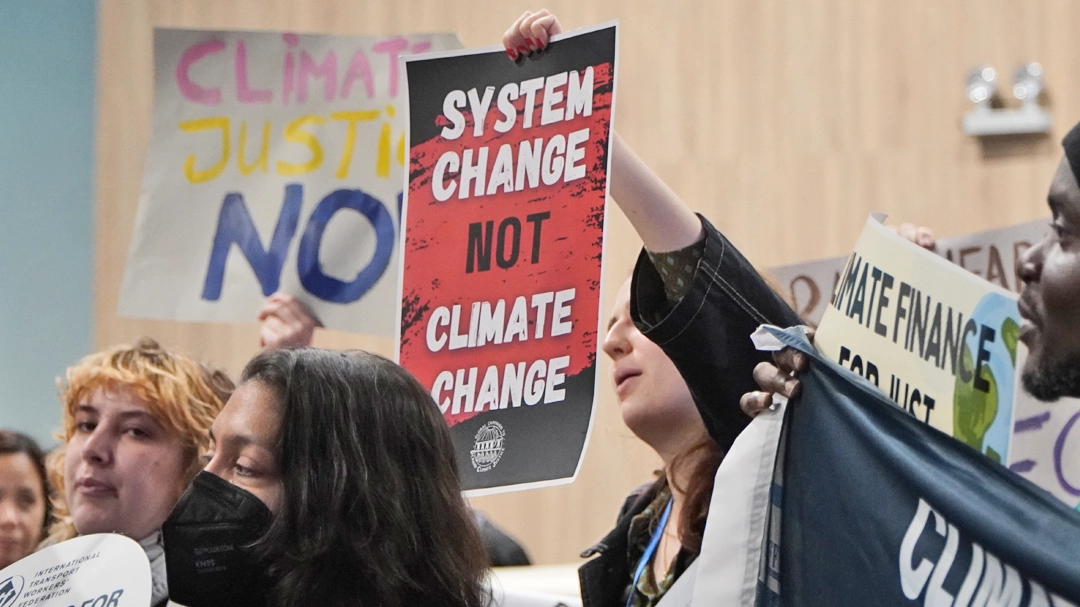
System change means profound social transformation in all countries and at all levels – local, national, and global. There must be a rapid, equitable and just transition to new modes of production, distribution, consumption and social reproduction that are aimed at providing for the needs of people and communities, founded on collective and sustainable stewardship of the commons, and compatible with ecological integrity and the limits of the planet, rather than the relentless pursuit of profit.
The huge and continuing net extraction of natural resources and wealth from the Global South to the Global North must end, and thus the relations, structures, and policies that enable it. The inequitable and exploitative economic and political relations between and within countries must be transformed, and the unjust institutions of global economic and financial governance must be profoundly recast if not completely replaced to ensure democratic global economic and financial governance. Economic, social, gender, environmental, and cultural rights must be protected and fulfilled. Control of and benefits from economic and financial resources must be redistributed equitably and democratized. There must be a rapid, equitable, just and direct shift from fossil fuel energy systems to renewable, democratic energy systems that does not reproduce corporate capture and technological dependence. The Global North must pursue the energy shift much faster as well as fund a big part of the cost in the Global South – consistent with the North’s huge share of historical, cumulative globalGHG emissions and the production and consumption of fossil fuel energy. Environmental destruction must be stopped, and ecological restoration must be decisively pursued. Militarised security systems by which elites govern people and the planet at gunpoint, must be dismantled and replaced with institutions and practices that uphold human rights and are focused on the collective safety and well-being of people and communities Reparations must be paid and restorative justice measures pursued by governments, elites, institutions and corporations for historical and continuing harms.
The transition to equitable, just, sustainable, regenerative, and post-carbon global and national economies must also be equitable and just. An equitable and just transition:
- Acknowledges the unequal responsibilities for the historical and ongoing harms caused by the current system, as well as the unequal distribution of its benefits, and ensures that those who have promoted and profited the most from the system must shoulder the greatest share of the cost of the transition (globally and within countries) in addition to the responsibility to shift away from their own unsustainable patterns of extraction, production distribution and consumption. It also ensures that the benefits of the transition are shared equitably, both within the current generation and across future generations, recognizing our responsibility to preserve environmental, social, and economic well-being for those yet to come.
- Involves reparations and restorative justice, and prevention of new forms of harm
- Guarantees secure, and sustainable and dignified jobs and livelihoods for workers, communities, and people, including those caught up in polluting industries
- Centers the needs and rights of affected people
- Embrace local solutions, shifting economic power from multinational corporations to worker-led cooperatives, community-based enterprises, and democratically owned and managed economic institutions
- Does not ignore or replicate but actively dismantles colonial, racial, and gendered inequities
- Upholds democratic participation and the rights of people and communities to shape decisions about economies, natural resources, and energy systems
- Pursues transition strategies that are transparent, inclusive, and accountable – not controlled by corporations or elites – and respects civil, political, social, and economic rights, including free, prior, and informed consent
- Recognizes and ensures the centrality of the role and responsibility of states in ensuring the above, and thus that of public finance
Despite the overwhelming odds, resistance and struggles for change are alive. The world may be unraveling, but it is also being rewoven, community by community. In every part of the world, people are fighting for their survival and their future. Movements are being strengthened and building networks rooted in care, solidarity, and radical hope.
The forces of repression, extraction, and exploitation are powerful and deeply entrenched. But history shows that when people organize, even the most immovable structures can shift, and what seems impossible can be realized.
We invite all citizens, groups, communities, and movements everywhere – this year, 2025, let us take our struggles to new heights. Let us join forces and together organize globally coordinated mobilizations – in various forms, in different cities and towns, in as many countries as we can – during these Global Days of Action:
